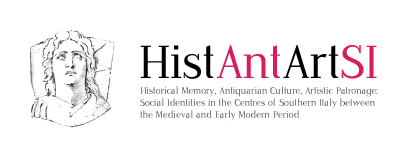
Historical Memory, Antiquarian Culture, Artistic Patronage:
Social Identities in the Centres of Southern Italy between the Medieval and Early Modern Period
Programma: VII Programma Quadro
Coordinatore: Prof.ssa Bianca De Divitiis
SSD: L-ART/02
Area: 10
Data inizio: 01/01/2011
Data fine: 31/01/2013
Proroga: 30/12/2015
Costo totale: € 1.500.000,00
Ente capofila: Università degli Studi di Napoli Federico II
Altri partner: Census of antique works of art and architecture known inthe Renaissance, Warburg Institute School of advanced study University of London
Sito del progetto: http://histantartsi.eu/
Abstract:
From the twelfth century southern Italy was overrun by foreign rulers and their houses and saw fierce dynastic struggles for succession. In attempting to cope with these sudden changes and upheavels, the local urban communities continually found themselves faced by the need to legitimize and reconfirm their status through actual negotiations with the king, and eventually with the baron. In this context the procedures and methods used to construct specific local identities take on particular importance, as do those used by individuals and families to affirm their social position. Through an interdisciplinary team the project seeks to identify the conscious and strategic use of archival and literary sources, and of local antiquities, in methods of self-representation adopted by the elite and by the local communities in the Regno di Napoli between the medieval and early modern period beginning with Campania and then extending to Puglia, Calabria, Lucania, Molise and Abruzzo. The aim of the project is to establish a balanced view of southern continental Italy and to create new instruments which will improve not only international academic knowledge but can benefit civil society as a whole, as well as institutions in laying the foundations for a new conservation strategy to protect and manage the cultural patrimony of southern Italy, a region which has contributed significantly to the formation of a European identity. An accessible database on the Internet will be specifically designed and programmed to gather together all the data from this research pre-requisite for studying such themes, and will provide a new instrument and new prospects of research for scholars world-wide.
